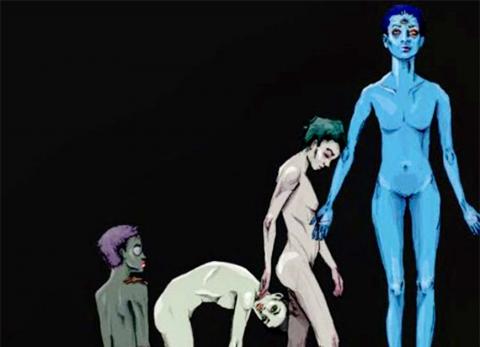Tell Me I’m Pretty, Cage the Elephant, RCA
“Hold on with all your might/ You’re gonna die, die,” Matt Shultz sings on Cage the Elephant’s fourth album, Tell Me I’m Pretty. The song, Cry Baby, goes bounding along on a triplet beat and a hopping bass line, but there’s no hiding its morbid streak, which resurfaces throughout the album. Cage the Elephant, a band from Kentucky, has always been conscious of death; its best-selling song, the 2008 hit Ain’t No Rest for the Wicked, continues that thought with “until we close our eyes for good.” But until now, the band’s boisterous momentum always held grim thoughts at bay. Now they’re in the foreground.
Cage the Elephant’s music slices across multiple eras of rock. Its songs have pointed toward the Beatles, the Pixies, glam, grunge and garage-rock, topped by Shultz’s rambunctiously frazzled lead vocals. The band’s previous album, Melophobia in 2013, defied its title with nervy, abundant hooks and pushy guitars; it reached the Top 20. But Tell Me I’m Pretty turns inward.

The album was produced by Dan Auerbach of the Black Keys, who brings out Cage the Elephant’s late-1960s and early-1970s affinities: analog-sounding keyboards, acoustic strumming, fuzz-toned electric guitars echoing psychedelia and T. Rex, lots of tambourine-shaking.
But the bigger change is in the songs, which no longer promise that rock brashness can overpower adversity. Sweetie Little Jean uses steady music-hall chords to ponder the fate of a missing person, concluding, “I think we should just let go.” A bleak ballad with hints of Radiohead and Oasis, How Are You True envisions, “All your days spent countin’ numbers ‘til one day you’ll find/ That life has passed you by.”
The band works up a stomping, tom-tom pounding riff in Punchin’ Bag to sing about a woman fighting back against domestic abuse and puts a rockabilly beat under a backing chorus of “Oh no!” to warn “She’s gonna try to break ya” in Mess Around. The most hopeful come-on arrives in Portuguese Knife Fight: “I wanna waste my life with you.”

It’s a daring, deliberate shift for Cage the Elephant. But in its single-mindedness, the album sacrifices the wildly seesawing balance between life force and mortality that gave the band its verve.
— JON PARELES, NY TIMES NEWS SERVICE
Ardipithecus, Willow, Roc Nation

“What the heck is happening?” Willow Smith sings in Cycles, a song from Ardipithecus, her first full album. “Why am I here?” “Why can I sing?”
There’s a lot of that in Ardipithecus: common youthful dissociative feelings, sudden long-view glimpses of the self. For Smith, the 15-year-old daughter of Will and Jada Pinkett Smith, it’s a really long view. She’s writing diaristic, run-on narrative songs, and singing them in an authentically mystical or overwrought way, but many of the details have to do with astral planes, Mesopotamian deities, crystals, Gaia and the third dimension. She has the point of view of someone who knows things. At the same time, for philosophical reasons, she doesn’t want to know a lot of things. She’s got a song about that called IDK.
Ardipithecus is a little under an hour of homemade neo-neo soul and spartan vanguardist pop fed by occult teen-speak and, seemingly, the television cartoon Adventure Time. (Two tracks here are about Marceline, the vampire-musician character from that show.) It has little regard for a marketplace: It’s essentially a Bandcamp record released by Roc Nation.
Smith has written and produced almost the whole album herself, and she keeps it simple: She organizes her free-associative words into melodic lines over two chords and midtempo beats. The introduction of other producers on a few tracks — including Mel Lewis, aka Chaos, and Ant Bell, and her half brother Trey Smith (as AcE) — seems to lead her away from her own sound, toward something lusher and more generic. This is a record that never stops threatening to be dull — in the way that Miley Cyrus’ record of mind-blurt autonomy from this year was dull — but rarely is, except when others try to streamline a lumpy aesthetic.
Like many teenagers, Smith is unfocused in a macro sense and incredibly focused in a micro sense. She has a skill for using very little. The two chords in Natives of the Windy Forest sound rough and scratchy, as if strummed on a viola, over intermittent snare-drum rolls; F Q-C #8 is arranged sparsely for harp, xylophone, electric guitar and drips of drums. (It changes to a dance-floor beat halfway through, when Smith murmurs “grab your neighbor’s hand” and then chants “Om.”) It is the only track for which she has written a note of explanation: “I have an on going list of F Q-C songs. These songs were created through characters I have developed within my mind.” Fair enough.
— BEN RATLIFF, NY TIMES NEWS SERVICE
Code Red, Monica, RCA
Contemporary R&B is being eroded from multiple directions: Hip-hop has absorbed its melody, and pop has thinned out its signature vocal gambits. Anodyne traditionalists make hay in the genre’s adult contemporary wing, but the mainstream’s center is so diffuse that R&B is s beginning to feel less like a genre and more like an accent.
Into this morass steps Monica, a consistent and reliable singer for two decades now, who is releasing Code Red, her eighth studio album. At 35, and a decade removed from her biggest hits, she’s in a liminal space — not an etched-in-stone elder but not an innovator.
On the tepid, noncommittal Code Red, that manifests in the tension between traditionalist instincts and modern music-making imperatives, which make for uneasy neighbors.
Though in places, like on the title track, Monica is almost sing-rapping, she’s far more comfortable with — and adept at — traditional soul singing. But throughout this album, almost every instance of elegant, strong vocals comes with a current-day caveat. On the jumbled Just Right for Me, it’s a thick drum arrangement and a Lil Wayne cameo. On Hustler’s Ambition, an elegant duet with Akon and one of this album’s best songs, it’s subject matter: The song is about the committed love between a criminal and his woman.
These are the choices of an artist trying to thread several needles at once. But Monica may truly be a nostalgist at heart. Near the end of the album comes I Miss Music, a song-length reminiscence-cum-complaint about the lasting value of music. She sings about Stevie Wonder, Lauryn Hill, Michael Jackson, Kurt Cobain. Over and over again, she asks, “What am I gonna sing to?” as if being the answer to her own question weren’t even an option.
— JON CARAMANICA, NY TIMES NEWS SERVICE

As we live longer, our risk of cognitive impairment is increasing. How can we delay the onset of symptoms? Do we have to give up every indulgence or can small changes make a difference? We asked neurologists for tips on how to keep our brains healthy for life. TAKE CARE OF YOUR HEALTH “All of the sensible things that apply to bodily health apply to brain health,” says Suzanne O’Sullivan, a consultant in neurology at the National Hospital for Neurology and Neurosurgery in London, and the author of The Age of Diagnosis. “When you’re 20, you can get away with absolute

When the South Vietnamese capital of Saigon fell to the North Vietnamese forces 50 years ago this week, it prompted a mass exodus of some 2 million people — hundreds of thousands fleeing perilously on small boats across open water to escape the communist regime. Many ultimately settled in Southern California’s Orange County in an area now known as “Little Saigon,” not far from Marine Corps Base Camp Pendleton, where the first refugees were airlifted upon reaching the US. The diaspora now also has significant populations in Virginia, Texas and Washington state, as well as in countries including France and Australia.

On April 17, Chinese Nationalist Party (KMT) Chairman Eric Chu (朱立倫) launched a bold campaign to revive and revitalize the KMT base by calling for an impromptu rally at the Taipei prosecutor’s offices to protest recent arrests of KMT recall campaigners over allegations of forgery and fraud involving signatures of dead voters. The protest had no time to apply for permits and was illegal, but that played into the sense of opposition grievance at alleged weaponization of the judiciary by the Democratic Progressive Party (DPP) to “annihilate” the opposition parties. Blamed for faltering recall campaigns and faced with a KMT chair

A police station in the historic sailors’ quarter of the Belgian port of Antwerp is surrounded by sex workers’ neon-lit red-light windows. The station in the Villa Tinto complex is a symbol of the push to make sex work safer in Belgium, which boasts some of Europe’s most liberal laws — although there are still widespread abuses and exploitation. Since December, Belgium’s sex workers can access legal protections and labor rights, such as paid leave, like any other profession. They welcome the changes. “I’m not a victim, I chose to work here and I like what I’m doing,” said Kiana, 32, as she